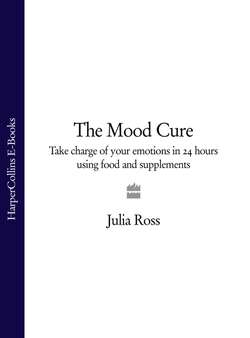Читать книгу The Mood Cure: Take Charge of Your Emotions in 24 Hours Using Food and Supplements - Julia Ross - Страница 88
CHAPTER 5 All Stressed Out How to Recover from Adrenal Overload
ОглавлениеWhat does the word stress mean to you? Do you immediately think of the threat of war, the pressure of too many deadlines, too much debt, a bitter divorce, or the death of a loved one? If you do, of course you’re right, but these kinds of stressors are only part of the problem. Surprisingly, they’re sometimes the least of it. There are many less obvious but equally potent factors that can keep us feeling overwhelmed: the biological trauma that can be inflicted upon us by things like a punishing diet, brutal workouts, silent infections, or inherited deficiencies in our stress-coping capacity.
Stress isn’t necessarily a bad thing; in fact, we need a certain amount of stress to keep us alert, help us get things done, and add spice to our lives. But when stress is chronic and relentless, it can have just the opposite effect. It can eventually leave us too depleted to enjoy life or even to function normally.
The problem is that the human body was designed to deal with entirely different kinds of stresses from those we’re confronted with today. The stress response system we’ve inherited helped our ancestors flee from the occasional wild animal or warring tribe, but is ineffective for the modern kinds of multiple, nagging, continual pressures many of us must endure.
All stressors trigger the same cascade of powerful biochemical events, and it all begins in the adrenal glands. Small but mighty, your adrenals sit like supercharged golf balls on top of your kidneys in your lower back. Think of them as your “A Team,” and be very grateful that you have them, because without them, life would be literally unbearable.
The adrenals are very hard workers, producing from thirty to sixty different hormones. When confronted with a stressful situation, they immediately increase the production of two—first adrenaline and then Cortisol. The adrenaline surge alerts you to imminent danger and prepares you to fight or flee. But this is meant to be a short-lived response. After the initial shot of adrenaline, the adrenals pump out Cortisol, which helps subdue the adrenaline rush and infuses you with strength and stamina. Longer-acting Cortisol is extremely important for your sense of well-being, particularly in the face of ongoing stress. It’s a prolonged Cortisol surge, for example, that keeps concentration camp prisoners and anorexics alive through one of its more extraordinary capabilities—that of raiding the body’s own muscles, bones, and fat tissues to salvage the nutrients essential for survival. Cortisol is the “can do” hormone, the “bring it on” hormone. It’s the hormone that allows you to conquer, rather than succumb, to ongoing adversity.1 Up to a point.
If continual overtime or an endless lawsuit keep the pressure coming, the levels of adrenaline and Cortisol can pump too high, too often, and keep you feeling chronically wired and strained. Surprisingly, though, many of the modern-day stressors that trigger these excessive reactions have nothing to do with upsets, injuries, anger, or fear. For example, a high-sugar, low-protein diet can trigger stress reactions without our even realizing it, and so can any severe or chronic infection.2 So can caffeine and environmental chemicals we’re exposed to on a daily basis. Whatever the cause, constant exposure to elevated stress hormones not only keeps us in an overamped emotional state, it can also lead to significant physical problems such as heart disease, osteoporosis, obesity, dampened immune function, and Alzheimer’s disease. It can destroy cells in the center of the brain responsible for the storage and transfer of memory as well. See why I take stress so seriously? And so should you.
